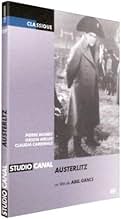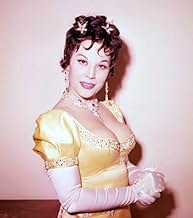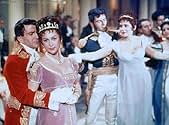AVALIAÇÃO DA IMDb
6,2/10
1 mil
SUA AVALIAÇÃO
Mais uma das aventuras de Napoleão nesta épica reconstrução da batalha de Austerlitz, onde teve a maior vitória de sua carreira, sobre os russos.Mais uma das aventuras de Napoleão nesta épica reconstrução da batalha de Austerlitz, onde teve a maior vitória de sua carreira, sobre os russos.Mais uma das aventuras de Napoleão nesta épica reconstrução da batalha de Austerlitz, onde teve a maior vitória de sua carreira, sobre os russos.
- Direção
- Roteiristas
- Artistas
- Prêmios
- 1 indicação no total
- Direção
- Roteiristas
- Elenco e equipe completos
- Produção, bilheteria e muito mais no IMDbPro
Avaliações em destaque
Abel Gance's unabashed adoration of Napoléon Bonaparte bore fruit in one of the undisputed masterpieces of silent cinema. Thirty-four years later he again depicts his hero in a film that is totally devoid of the flair and dazzling inventiveness of the earlier work. He is assisted by Roger Richebé who had directed Gance's original Napoléon, Albert Dieudonné, in that actor's second outing in the role in 'Madame sans-gene.' Here he is played by Pierre Mondy.
One is impressed by the art direction, costume design and the beautifully shot series of tableaux vivants by Messieurs Alekan and Juillard but alas the whole enterprise is verbose, bombastic, self-indulgent and uninspired and fails to justify its lumbering two and three-quarter hour length.
Most of the males are marionettes with the notable exceptions of Welles, Marais, Trintignant and Marchal whilst grizzled Michel Simon does an outrageous turn as one of Napoléon's Old Guard. Plenty of cleavage on display and an enchanting cameo by Leslie Caron as one of Bony's extra-marital activities. The most ludicrous piece of casting is that of Jack Palance as an Austrian General. As Pope Pius V11 an utterly expressionless Vittorio de Sica calls Bonaparte ' a comedian' which pretty well sums up Pierre Mondy's portrayal.
Regarding Monsieur Gance's output I think it fair to say that 'silence is golden.'
One is impressed by the art direction, costume design and the beautifully shot series of tableaux vivants by Messieurs Alekan and Juillard but alas the whole enterprise is verbose, bombastic, self-indulgent and uninspired and fails to justify its lumbering two and three-quarter hour length.
Most of the males are marionettes with the notable exceptions of Welles, Marais, Trintignant and Marchal whilst grizzled Michel Simon does an outrageous turn as one of Napoléon's Old Guard. Plenty of cleavage on display and an enchanting cameo by Leslie Caron as one of Bony's extra-marital activities. The most ludicrous piece of casting is that of Jack Palance as an Austrian General. As Pope Pius V11 an utterly expressionless Vittorio de Sica calls Bonaparte ' a comedian' which pretty well sums up Pierre Mondy's portrayal.
Regarding Monsieur Gance's output I think it fair to say that 'silence is golden.'
...and to "Napoleon" whose life Gance transferred to the screen in the silent era.Sandwiched between two very underrated Gance works ("la Tour de Nesles" and "Cyrano et D'Artagnan" )it is a return to "real " "true" history.I will go as far as to write that Gance impressed me much more when his movies dealt with fictionalized history (the two mentioned movies,but "j'accuse" too)."Austerlitz has something academic ,conventional.It has nothing of Gance's madness.The first part is a stream of stars from Martine Carol to Claudia Cardinale ,from Jean Marais to Orson Welles (in a part which reminds us how Gance was interested in the development of science through the centuries ,à la Jules Verne,we find this interest in "Cyrano" and "J'accuse" too).THe lead is a good actor but he might be ,on an international level, the least known of them all:Pierre Mondy's name is buried in the cast and credits and although he is on the screen from the beginning to the end,his name is not bigger than that of Welles who appears barely five minutes.Ah fame! The first part has only one sequence where we find back the inventive Gance:we do not attend the coronation in Notre Dame ;the marechal de Ségur (Jean-Louis Trintignant) tells the whole story with the model in front of a strange audience:servants ;then the "mamma " ("pourvu que ça dure!=lets hope it lasts!") ,Napoleon's mother (Elvire Popesco) enters and her tears begin to flow .Although David put her in his famous painting she did not attend the ceremony.
The second part is more historically interesting ,but if you are not fond of military strategy ,you may stop yourself yawning.Fortunately a soldier of the old guard of Napoléon (un "grognard" )played by Michel Simon brings a bit of life among these troop movements.
Last but not least:I have always asked myself why a convinced pacifist such as Gance (his two versions of "j'accuse" may be the strongest anti-war films ever)could be so fascinated by a warrior such as Napoleon.
The second part is more historically interesting ,but if you are not fond of military strategy ,you may stop yourself yawning.Fortunately a soldier of the old guard of Napoléon (un "grognard" )played by Michel Simon brings a bit of life among these troop movements.
Last but not least:I have always asked myself why a convinced pacifist such as Gance (his two versions of "j'accuse" may be the strongest anti-war films ever)could be so fascinated by a warrior such as Napoleon.
This movie is a huge disappointment. You'd expect the battle of Austerlitz to be the core subject as the title suggests, but it's not. Most of the movie is about the Napoleonic era before the battle, with a pseudo historic perspective. If you know just a little about history, you'll find yourself yawning most of the time, as Abel Gance tries to describe the situation for hours, through endless dialogs. Then when Napoleon is about to be crowned, you think: oh no, not another half hour just for that scene. Fortunately there's no coronation scene, but.. worse: it's told! You guess correctly: Gance didn't have the budget to do it. He might as well just skipped the whole episode.
By then you've waited more than 2 hours and still no battle in sight. At last the battle comes but what you see is a tragic waste. The tactics and whereabouts of the battle are not shown but told, and you can hardly understand what's going on. A cavalry charges from right to left (a couple hundred horses), and you assume it's the Austrian cavalry. Then you're told that they're defeated by the French, and you see the same guys charging from left to right (they don't even seem to have switched costumes). Parts of the battle were filmed in studio, with ridiculous painted backgrounds. The close combat scenes are unrealistic at best. Soldiers fall apparently for no reason, and if nobody told you about the outcome, you wouldn't know who won or lost. The last scene with the French Army singing the national anthem completes the cinematographic disaster.
All in all, you sit back with the feeling that this movie was conceived and shot in the early days of movie making, not in 1960: it's not a movie about Austerlitz, it's the pathetic attempt of an aging man trying to describe the glory of an emperor he admired. The result is a boring picture that doesn't even enhance our historic understanding of the Napoleon era (in spite of Gance's attempts to stick to some historic details).
By then you've waited more than 2 hours and still no battle in sight. At last the battle comes but what you see is a tragic waste. The tactics and whereabouts of the battle are not shown but told, and you can hardly understand what's going on. A cavalry charges from right to left (a couple hundred horses), and you assume it's the Austrian cavalry. Then you're told that they're defeated by the French, and you see the same guys charging from left to right (they don't even seem to have switched costumes). Parts of the battle were filmed in studio, with ridiculous painted backgrounds. The close combat scenes are unrealistic at best. Soldiers fall apparently for no reason, and if nobody told you about the outcome, you wouldn't know who won or lost. The last scene with the French Army singing the national anthem completes the cinematographic disaster.
All in all, you sit back with the feeling that this movie was conceived and shot in the early days of movie making, not in 1960: it's not a movie about Austerlitz, it's the pathetic attempt of an aging man trying to describe the glory of an emperor he admired. The result is a boring picture that doesn't even enhance our historic understanding of the Napoleon era (in spite of Gance's attempts to stick to some historic details).
Austerlitz (1960) was the battle that made Napoleon Bonaparte not only one of western civilization's greatest generals, but it solidify his position as Napoleon I "The Emperor of France". I saw this film many years ago on video. The colors were washed out and it was cropped big time. Besides these faults, the movie was great. If there's a movie that needs to be restored it's this one. A film of this magnitude and the grand scale it was presented on needs to be shown it is original glory.
NAPOLEON was restored recently. It's only fitting that the film that the same director spent his entire life on have one of it's sequels be remastered and preserved in the same way.
Highly recommended.
NAPOLEON was restored recently. It's only fitting that the film that the same director spent his entire life on have one of it's sequels be remastered and preserved in the same way.
Highly recommended.
This is two different movies stuck together. In the first part Napoleon is introduced in a very informal way, showing him debating hats with his personal valet. For a moment I thought it was going to be a comedy... Then the plot takes a more serious turn, with Napoleon in Paris, undecided about seizing power and proclaiming himself emperor. I watched the original French version, which includes several scenes in English, showing the British plotting against Napoleon and the events leading to the execution of the duke d'Enghien.
Still in Paris we are shown Napoleon's greedy family and mistress, and his coronation (luckily only narrated) and then the story finally marches (literally) toward the battle of Austerlitz. Several scenes show the Russians and the Austrians preparing for war and debating in French, as the only common language and then the battle itself, which is a long and slightly boring series of scenes lasting over one hour, with a bit of battle, then Napoleon talking strategies with his generals, more battle, strategies discussed by Russians and Austrians and again battle and Napoleon.
Napoleon won this one, considered as his greatest success and Gance wraps up the movie on a patriotic and chauvinist note, with the Marseilles blasting on screen.
Despite the sumptuous costumes and the many stellar cameos, the film is uneven in tone and contains some weird scenes: the opening with Pierre Mondy as a peevish Napoleon is bizarre as is the scene with Napoleon in a bathtub discussing with his ministers; Napoleon encounters with his lover are superfluous as is the meeting with Robert Fulton (played nonetheless by Orson Welles in a useless cameo); the coronation narrated to the servants with the help of puppets is beyond bizarre and even the battle drags on forever, without an apex.
Still in Paris we are shown Napoleon's greedy family and mistress, and his coronation (luckily only narrated) and then the story finally marches (literally) toward the battle of Austerlitz. Several scenes show the Russians and the Austrians preparing for war and debating in French, as the only common language and then the battle itself, which is a long and slightly boring series of scenes lasting over one hour, with a bit of battle, then Napoleon talking strategies with his generals, more battle, strategies discussed by Russians and Austrians and again battle and Napoleon.
Napoleon won this one, considered as his greatest success and Gance wraps up the movie on a patriotic and chauvinist note, with the Marseilles blasting on screen.
Despite the sumptuous costumes and the many stellar cameos, the film is uneven in tone and contains some weird scenes: the opening with Pierre Mondy as a peevish Napoleon is bizarre as is the scene with Napoleon in a bathtub discussing with his ministers; Napoleon encounters with his lover are superfluous as is the meeting with Robert Fulton (played nonetheless by Orson Welles in a useless cameo); the coronation narrated to the servants with the help of puppets is beyond bizarre and even the battle drags on forever, without an apex.
Você sabia?
- CuriosidadesIn the 1920s Abel Gance had written a six-part movie biography of Napoleon. He shot the first part (Napoleão (1927)), which turned out to be a financial disaster. He sold the sixth part to Lupu Pick, who shot Napoleon auf St. Helena (1929). Wanting to make a comeback at the end of the 1950s, Gance rewrote the third part to make it "Austerlitz".
- Erros de gravaçãoIn the scene in William Pitt's office in London which is set in the early 1800's, you can see in the background through the window the Houses of Parliament and Big Ben, 60 years before they were built.
- Versões alternativasThe original French version runs longer than the English dubbed international one. It contains extra scenes including ones with Napoleon visiting his mistress and of Ségur (Jean-Louis Trintignant) imagining the coronation of the emperor for the palace staff.
- ConexõesEdited into Histoire(s) du cinéma: Seul le cinéma (1994)
Principais escolhas
Faça login para avaliar e ver a lista de recomendações personalizadas
- How long is The Battle of Austerlitz?Fornecido pela Alexa
Detalhes
- Data de lançamento
- Países de origem
- Idioma
- Também conhecido como
- A Batalha de Austerlitz
- Locações de filme
- Empresas de produção
- Consulte mais créditos da empresa na IMDbPro
Bilheteria
- Orçamento
- US$ 4.000.000 (estimativa)
- Tempo de duração2 horas 46 minutos
- Mixagem de som
- Proporção
- 2.35 : 1
Contribua para esta página
Sugerir uma alteração ou adicionar conteúdo ausente

Principal brecha
What is the English language plot outline for Com Sangue se Escreve a História (1960)?
Responda





































